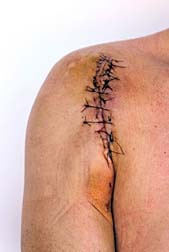 It has been reported that doctors have been encouraged to use the infusion pumps for the delivery of pain medication directly to the affected area, even though infusion pumps were not originally approved by the US Food and Drug Administration (FDA) for this purpose. It is within a doctor's mandate to authorize the use of a drug, or an appliance for any purpose outside of the approval boundaries set forth by the FDA, although manufacturers are not allowed to actively promote products for non-approved applications.
It has been reported that doctors have been encouraged to use the infusion pumps for the delivery of pain medication directly to the affected area, even though infusion pumps were not originally approved by the US Food and Drug Administration (FDA) for this purpose. It is within a doctor's mandate to authorize the use of a drug, or an appliance for any purpose outside of the approval boundaries set forth by the FDA, although manufacturers are not allowed to actively promote products for non-approved applications.Meanwhile, it is said that the FDA has placed shoulder pain pumps on a medical watch list.
The problem—and there are at least 30 pending lawsuits to back this up—appears to be what happens after arthroscopic surgery on the shoulder. In more and more cases, doctors are opting for the use of a shoulder pain pump, or infusion pump to deliver pain medication directly to the affected area post-operatively. The pump is connected to a catheter implanted into the shoulder immediately upon the conclusion of surgery. The effort is undertaken in the best interests of the patient, with regard to pain management.
The irony is that the use of the shoulder pain pump could ultimately make the actual surgery to improve the shoulder, a moot point. That's due to Postarthroscopic Glenohumeral Chondrolysis (PAGCL), a condition that results in the breakdown and deterioration of the cartilage in the shoulder.
When that happens, suddenly very young people start feeling very old. They can't indulge in their favorite sports any longer, and they can't move like they used to. Many PAGCL patients have developed sleep disorders, as the pain keeps them up at night. Job performance can be affected. For all this to happen to an individual at a very young age, can take a horrific emotional toll.
In sum, PAGCL can be life-altering—and in the case of the Aussie, the use of the pain pump after his routine shoulder surgery proved to be life-ending.
Richard Valentine was described as fit and healthy when, at 38 he was admitted to Mercy Private Hospital in Melbourne for routine rotator cuff surgery on his shoulder in October, 2005.
The use of a pain pump to infuse morphine for pain led to his death. Valentine's surgeon testified at an inquest that he had ordered 32.5mg of morphine over the space of 24 hours for his patient to ease intense pain associated with the surgery. Valentine was also taking Phenergan, and an anti-depressant that he had used for several years, of which the surgeon was presumably aware. The patient was checked every two hours, which was hospital policy.
And yet when family visited Valentine at 9pm the night he died, they reported he was drooling, drowsy and unusually erratic. Nursing staff report the patient appeared normal an hour and ten minutes later. At midnight he was snoring, so they didn't wake him.
At 2am they couldn't wake him.
READ MORE SHOULDER PAIN PUMP LEGAL NEWS
A shoulder pain pump is a device, after all. And devices are not infallible.
In May of this year a petition was filed in an attempt to consolidate all shoulder pain pump, and PAGCL lawsuits in a single, US Federal court, to be heard by a single judge. However, in July the petition was denied—and all defendants listed in the various lawsuits opposed consolidation.
There are at least 28 defendants named in the various US lawsuits: among them, Stryker Corp., I-Flow Corp., Smith & Nephew, Inc., DePuy, Inc., DJO, Inc., Breg, Inc. and AstraZeneca PLC, to name a few.
